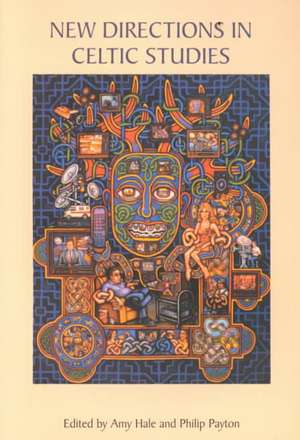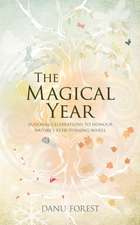New Directions In Celtic Studies
Editat de Amy Hale, Philip Paytonen Limba Engleză Paperback – 31 dec 1999
The primary aim of New Directions in Celtic Studies is to focus on contemporary issues and to promote interdisciplinary approaches within the subject. Written by international scholars and practitioners in fields such as folklore, ethnomusicology, art history, religious studies, tourism and education, the book brings together in one volume a wide range of perspectives. It responds to the recent questioning of the viability of the notion of 'Celticity' and the idea of Celtic Studies as a discipline and points to a renewed vitality in the subject.
New Directions in Celtic Studies is divided into four sections: popular culture and representation; commodities and Celtic lifestyles; contemporary Celtic identity and the Celtic diaspora; Celtic praxis.
Preț: 238.69 lei
Nou
Puncte Express: 358
Preț estimativ în valută:
45.67€ • 47.81$ • 38.01£
45.67€ • 47.81$ • 38.01£
Carte tipărită la comandă
Livrare economică 31 martie-14 aprilie
Preluare comenzi: 021 569.72.76
Specificații
ISBN-13: 9780859895873
ISBN-10: 0859895874
Pagini: 248
Dimensiuni: 231 x 155 x 15 mm
Greutate: 0.41 kg
Ediția:1
Editura: UNIVERSITY OF EXETER PRESS
Colecția University of Exeter Press
Locul publicării:United Kingdom
ISBN-10: 0859895874
Pagini: 248
Dimensiuni: 231 x 155 x 15 mm
Greutate: 0.41 kg
Ediția:1
Editura: UNIVERSITY OF EXETER PRESS
Colecția University of Exeter Press
Locul publicării:United Kingdom
Notă biografică
Amy Hale is Research Fellow in Celtic Studies at the Institute of Cornish Studies, University of Exeter. Philip Payton is Professor of Cornish Studies and Director of the Institute of Cornish Studies at the University of Exeter. He is the editor of the series Cornish Studies and the author of numerous books including The Making of Modern Cornwall (1992), The Cornish Overseas (1999; new edn. 2005) and A Vision of Cornwall (2002).
Cuprins
Introduction, Amy Hale and Philip Payton
Section One: Popular Culture and Representation
Section One: Popular Culture and Representation
1 Reading the Record Bins: The Commercial Construction of Celtic Music, Shannon Thornton (Doctoral candidate in Folklore at UCLA)
2 Representation of the Celts in Film and Television, Leslie Jones (Freelance writer, folklorist and Celticist)
3 Legend and Breton Identity, Antone Minard (Doctoral student in Folklore at UCLA)
Section Two: Commodities and Celtic Lifestyles
4 Reclaiming Celtic Spiritual Ancestry, Marion Bowman (Lecturer in the Study of Religions at Bath College of Higher Education)
Section Three: Contemporary Celtic Identity and the Celtic Diaspora
5 Pagans, Pipers and Politicos: Constructing Celtic Identities in a Festival Context, Amy Hale and Shannon Thornton
6 The Celtic Revival in Australia, Philip Payton
7 Ethnicity and the Individual: A Case Study in Scottish-American Identity, Deborah Curtis ((Research Fellow in Contemporary Celtic Studies at the Institute of Cornish Studies, University of Exeter)
Section Four: Celtic Praxis
8 Establishing the Manx Language Programme in Schools, Brian Stowell (Developer of the peripatetic Manx teaching programme in Manx schools)
9 The Development of Gaelic Tourism, Roy Pedersen (Developer with the Highlands and Islands Enterprise)
10 Rural Tourism and Identity in Western Ireland and Brittany, Moya Kneafsey (Research Fellow in Geography at the University of Coventry)
Conclusions and Remarks, Colin H. Williams (Research Professor in Welsh in the University of Wales, Cardiff)
Recenzii
“This volume will be of interest to the local historian for a number of reasons. Firstly, for the way in which the authors break out of the antiquarian mind-set with which Celtic scholars have, perhaps unfairly, been associated. Next, because of the way in which they represent Celticity and Cornishness as something for which people have an affinity, regardless of their ethnic origins . . . Finally, they remind local historians that, in researching the past, they are also re-defining the present and helping to re-shape the culture and identity of the future.” –The Journal of the Cornwall Association of Local Historians, Spring 2001







